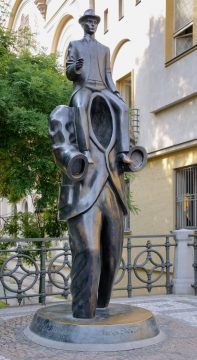by Shawn Crawford

Like most Kafka stories, “A Hunger Artist” inserts you into a bewildering situation, appears to offer you some solace and meaning, and then bewilders you all over again.
The Hunger Artist is just that: a man that starves himself for a living. But unlike Gregor Samsa awaking to find himself an enormous insect, this story echoes Kafka’s actual time and place (Europe from 1883-1924). Hunger artists traveled the continent, creating a craze like flagpole sitting or MMA fighting. Generally confined, guards watched over the artist to ensure he did not eat. Crowds would gather to take stock of an artist’s slow emaciation; postcards were sold with photos of the artist at his most gaunt state.
The hero of our story resides in a cage filled with straw. Children gather, clinging to each other in terror and wonder. The Artist’s handler, the Impresario, determines that forty days of fasting produces the largest crowds and peak interest before attention begins to wane. On the final day, the Artist emerges from his cage to great acclaim, angry that he cannot pursue his craft for even longer. Simply the delirium of hunger, the Impresario assures the crowd.
As the fad begins to decline, the Artist finds himself relegated to a circus, living in a cage surrounded by the show’s menagerie. But while he laments the lack of attention, he can now fast for as long as likes. He can take his art to the ultimate extreme. Spoiler alert: the artist starves himself to death. It’s Kafka after all.
After the initial shock, the reader has the chance to feel she can unlock the mystery. Here is a meditation on art and the sacrifices required to achieve transcendence. Even when his watchers turn their back, the Artist refuses to cheat and indulge in an even a morsel of food; he will not taint his creation or sully his craft. We congratulate ourselves on unlocking the code.
But Kafka denies us easy victories. In his cage forgotten and alone, one of the supervisors of the circus discovers the Artist nearly dead. The Artist asks for forgiveness, and the supervisor assumes the Artist has begun to lose his mind. “I always wanted you to admire my fasting,” the Artist whispers. The supervisor assures him that the crowd does.
I often think of Kurt Cobain when I read that line. April 5 marked the 25th anniversary of his death. The rock mythology of the self-destructive musician traces a line all the way to the Romantic notion of the tortured genius, creating while indulging in Byronic dissipation, required because a society can never understand the artist’s talent or pain. Are we being asked to admire the art or the demise of the artist that created it? Are we being offered the sublime or narcissist indulgence?
Perhaps “A Hunger Artist” is really a cautionary tale. Yet Kafka hasn’t finished. He never finishes. We discover the Artist has asked for forgiveness for a simple reason: “I had to fast. . . because I couldn’t find a food I enjoyed. If I had found that, believe me, I would not have made a spectacle of myself.” Welcome back to bewilderment. Does the Artist have talent or merely a compulsion? Left with no other choice but to fast, does the Artist become heroic or pathetic? They simply bury the Artist with his filthy straw, and we are never told.
Legend has it that Kafka and his friends read his stories and laughed until their sides ached; they understood the absurdity of their time and the coming destruction, summed up completely in the title of Robert Graves’ autobiography after the decimation of World War I, Good-bye to All That.
Now we find ourselves in a new age of absurdity, one in which we do not admire an artist’s fasting, but demand it, furious that we might be asked to pay for the passion and joy of a creation. Musicians will tell you the only way to make a living now is to tour relentlessly and sell merchandise, because that’s the only thing that can’t be pirated on the internet. Your craft dependent on t-shirt sales. The suggestion you pay for a song, or an essay, or a painting met with cries of “sell-out.” While the Kardashians make millions from endless selfies and vacant stares.
I once refused to write any magazine articles I didn’t sell through a query letter first; I wrote mediocre features but got paid once I cracked the formula. Dispirited, I quit writing for ten years. Then I decided to write what I wanted on my terms, but I rarely get paid in this strange new reality. In my ideal world, you would admire my fasting but insist on buying me a feast after the performance was complete. Kafka would die laughing.
